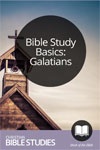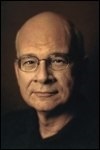What's at stake in Worship? Everything. That's what's at stake in worship. The urgent, indeed troubling, message of Scripture is that everything that matters is at stake in worship.
Worship names what matters most: the way human beings are created to reflect God's glory by embodying God's character in lives that seek righteousness and do justice. Such comprehensive worship redefines all we call ordinary. Worship turns out to be the dangerous act of waking up to God and to the purposes of God in the world, and then living lives that actually show it.
Worship, then, refers to something very big and very small, and much in between. It can point to the meaning and work of the whole created order. Worship can also be in the cry of a mother or in the joy of a new disciple. Worship can name a Sunday gathering of God's people, but it also includes how we treat those around us, how we spend our money, and how we care for the lost and the oppressed. Worship can encompass every dimension of our lives.
True worship includes the glory and honor due God—Father, Son, and Spirit. It also includes the enactment of God's love and justice, mercy and kindness in the world. This is the encounter and the transformation that is worth the pearl of great price, both for our sake and for our neighbor's. On the one hand, Scripture indicates that worship is meant to be the tangible embodiment of God's hope in the world. Conversely, the Bible also teaches that the realities of oppression, poverty and injustice can be both a call to worship and an indictment of our failure to do so.
Clearly we are not primarily speaking about worship here in the limited but important sense of the service of worship, though we will certainly reflect on that. Nor do we mean a still smaller piece of that service, the period of extended singing that is distinct from prayer and preaching that some call worship. This is not a hook about postmodern worship versus modern worship. We are not concerned here with the pros and cons of praise choruses versus hymns or with liturgical debates over the value of candles, video clips, worship cafes or special lighting. These issues may be as far as some have gone in considering the subject of worship.
When worship is our response to the One who alone is worthy of it—Jesus Christ—then our lives are on their way to being turned inside out. Every dimension of self-centered living becomes endangered as we come to share God's self-giving heart. Worship exposes our cultural and even spiritual complacency toward a world of suffering and injustice. In Jesus Christ, we are called into a new kind of living. Through the grace of worship, God applies the necessary antidote to what we assume is merely human—our selfishness. Worship sets us free from ourselves to be free for God and God's purposes in the world. The dangerous act of worshiping God in Jesus Christ necessarily draws us into the heart of God and sends us out to embody it, especially toward the poor, the forgotten and the oppressed. All of this is what matters most and is most at stake in worship.
So what's the problem? The church is asleep. Not dead. Not necessarily having trouble breathing. But asleep. This puts everything that matters at stake: God's purposes in the church and in the world.
Whether I think of myself, or congregations I have served as a pastor, or other churches across the country and around the world, it seems that many of us are asleep to God's heart for a world filled with injustice. It's no surprise that we also seem to be asleep to God's desire that out of worship should come a church that seeks and embodies the justice that's needed in the world. We are asleep to God's heart for the poor and oppressed, absorbed with our own inner life, wrestling with our own dreams and traumas that, for all their vividness, are unknown, unseen, and largely unreal to the world around us.
I offer these observations first as a personal confession. Slumber would not be far off the mark in describing my own vision and heart toward the world at times. Busy with life, preoccupied with ministry, absorbed with what is personal, local, immediate—it's easy to feel like there is not enough of me to go around as it is! So the thought of deliberately seeking to engage beyond these aspects of life can easily be neglected. Left to my own devices, I can live quite contentedly inside the bubble of my middle-class American life. Little in my world, apart from the presence and power of the gospel itself, would ever really demand or expect that I look beyond it. In clearer moments, I know this is a kind of sleepwalking. I write as one who is still just awakening, yet who is eager for others to join in imitating those who are truly awake.
Beyond my own personal confession, my observations of other Christians and churches and the absence of any strong evidence to the contrary convinces me that the church is largely asleep—even if it doesn't look like it. For example, I recently stood on the grounds of a remarkable church: vibrant, thoughtful, committed, engaged, creative. It was the first day of an enormous, richly choreographed vacation Bible school program. Amid the swirl of activity I watched the children in color-coordinated orange T-shirts dance and follow the worship band, whose faces were also projected larger than life on two huge screens up front.
Suddenly I felt that these hundreds of children were being put spiritually asleep—asleep to the God of the still small voice, to the God who suffered for the sake of the world, to the God who said, "Lay down your life, take up your cross, and follow me." Don't get me wrong; I do not doubt for a moment that the VBS leaders intended just the opposite. They were simply trying to find the best means to communicate to the children. But instead, what seemed evident to me was that this church, one that would by most measures be considered awake, was running the risk of investing astonishing energy in breeding and nurturing a yet more excellent sleep. Why? Because the primary message of its building, its programs, and its ministry announced that it was first and foremost an institution that was wealthy and white. The church's sociology was the primary message. The VBS production featured everything money and time could buy and was so central and primary that the gospel felt small and incidental in comparison. It felt like an instance of Jesus "in distressing disguise," indeed possibly beyond recognition.
Even more unnerving, I had to acknowledge that this could just as easily and just as well be said of the vibrant church that I pastor. My church's subculture is different, but not on a global scale. We have just finished a major building campaign and have enhanced our facilities substantially, with many years of effort and much expense. The privileges of churches like these can shroud the gospel in such middle- and upper-class consumer-oriented style and content that salvation subtly becomes more about providing a warm blanket of cultural safety than about stepping out into the bracing winds of spiritual sacrifice. Such patterns in a church's life can easily, if unintentionally, lead to a focus on consolidating and extending power instead of identifying with the powerless. The former is a lot more like a comfortable bed to sleep in than the latter. No wonder we don't want to wake up, let alone get up and get going in the work of justice.
It is too ambiguous to speak about the church in the United States as one large, encumbered entity. It is not. It encompasses various denominations and congregations, each with its own subcultures, groups and theologies. Examples of vivid wakefulness can be found—Christians and congregations whose lives are daily demonstrations of God's heart for justice. However, it still seems broadly the case that either the church is asleep or it may as well be. When measured against the global realities of life on planet Earth that silently scream for attention, the vast institutional life of American Protestantism seems functionally distant and disengaged. According to Scripture, that's an issue of worship. According to much church culture, there's no connection between worship and justice.
Many denominations are declining in membership. Each denomination has its own battles over various issues of the culture wars, seeking to be faithful to its traditions and convictions while at the same time trying to respond to today's circumstances. These discussions are largely internal, often passionate, frequently wounding and alienating to those inside the church but distant and disconnected to those outside it. Meanwhile, on a local level congregations require tending. Individuals and families have needs and crises. When our own immediate world overwhelms us, we can readily feel disinclined or unable to look beyond it.
When we do look beyond, however, we see vividly that the daily lives of millions of people around the world are about chronic desperation. The world is racked with dramatic, torturous suffering as a consequence of poverty and injustice—from human trafficking to HIV/AIDS, from malnutrition to genocide. One-sixth of the world's population lives in absolute poverty, and nearly a million children each year are sold or forced into the sex-trafficking trade. But this is not just about statistics—it's about real lives. People with names and families are living daily without food or water, in sickness or oppression. Their experience is in their bodies and hearts and minds, not in a global facts chart. They are made with the same dignity and worth as you and I. They have the same capacities and desires. But they are circumstantially without hope. Every day.
At a time when many are struck by the polarization between liberal and evangelical churches in America, it is more striking to see what the average congregations on both sides hold in common: they are asleep. Some seem asleep to God. Some seem asleep to the world. Some sleep on their right side, others on their left, but either way they are asleep. The way they sleep, the character of their dreams, the forms of their sleepwalking or sleep-talking varies. Varied, too, are the words and voices that cause restlessness, making their sleep less than tranquil: Inclusivity. Diversity. Faithfulness. Process. Power. Justice. Relevance. Recovery. Healing. Biblical. The words may stir the sleeping, but without enough urgency to demand awakening.
Too much sleep can lead to enervation and, in time, atrophy. A crisis hits—9/11 or the Asian tsunami or Hurricane Katrina, say—and like waking from a deep sleep or shaken by a nightmare, our churches raise their heads and try to rise to the occasion (if they can figure out what it is!). Before long, the clamor of crisis quiets down, and our desire to return to the safe coziness of familiarity is too hard to resist. Wakefulness demands too much energy or strength that cannot be mustered or sustained.
Some Christians and some congregations seem to have selective wakefulness. After all, we are weary, overwhelmed, insecure, internally longing for hope of our own (never mind the need for hope in the world). We don't see much beyond the edges of our own bed, whether it is culture, economics, race, denomination or class. We know and like our bed. We have made it. We are not inclined to leave it. We are entitled to it after all, since we see it as God's blessing.
Meanwhile, those without a bed—and without a home, food, safety, water, warmth or knowledge of the Savior's love—are not seen or remembered or reached. In light of the stark reality of lost and dying humanity, forced prostitution, bonded slavery, malarial epidemics, HIV/ AIDS and human life stripped of its dignity around the globe, where is the evidence that through worship our lives have actually been redefined and realigned with God's heart for justice in the world?
Many of us want to remain asleep. Pastors have in part fostered this somnambulating life with preaching that avoids problems and prophets, controversy and complexity. When preaching plays to the culture without substantially critiquing and engaging it, it becomes part of the problem. Sermons that only apply to the individual and to the inner life of the disciple without raising biblical questions about our public lives are also a factor. So, too, are worship services that offer little more than comfort food: the baked potatoes of love, the melting butter of grace, with just enough bacon and chives of outreach to ease the conscience. All this becomes a churchly anesthetic.
I grew up at the edge of church life, believing that pastors were people who attended to a world of very small things with obsessive care, Now that I am a pastor and work among many other pastors, I confess that this is often true, although perhaps by habit rather than desire. The projects and preoccupations of each day can keep me more than busy. Like most pastors, I want to be a faithful shepherd. I want to focus on the call right before me. That can easily seem like too much on most days, but it can also be small and myopic. It lends itself to sleepwalking, which is already too attractive to many of those we lead.
Jesus, if anything, was and is awake. That's the shock for those who encounter him in the Gospels. He came to make a world of those who are awake—awake to God, to each other and to the world. Waking up is the dangerous act of worship. It's dangerous because worship is meant to produce lives fully attentive to reality as God sees it, and that's more than most of us want to deal with. Yes, true worship always questions the dominant paradigms, even those within the church. It asks whether we are bowing before reality or falsehood, before God or idols.
One of the most dramatic periods of Israel's history came about because of the nation's failure to live its worship. God's criticism of Israel was that it professed what it failed to live. It went through the external signs of worship but failed to live out what the worship was meant to show. The Old Testament prophet Micah distilled Israel's call at that critical time: "What does the LORD require of you but to do justice, and to love kindness, and to walk humbly with your God?" (Micah 6:8)
Though frequently quoted, these words are meant to be lived. To do so means we must wake up.
Excerpted from The Dangerous Act of Worship, by Mark Labberton (IV Press). Used by permission of InterVarsity Press PO Box 1400 Downers Grove, IL 60515. www.ivpress.com.
Copyright © 2011 by Christianity Today/ChristianBibleStudies.com. Click here for reprint information.













